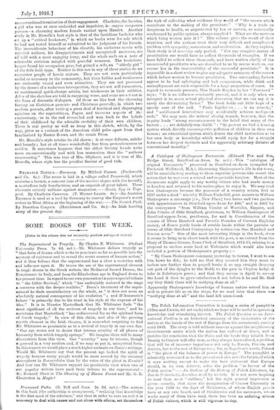Downward Paths. (G. Bell and Sons. 2s. (3d. net.)—The writers
In this book (the authorship is anonymous), "realizing that knowledge Is the first need of the reformer," and that in order to cure an evil it is necessary to deal with causes and not alone with effecte, set themselves the task of collecting what evidence they &mild of "the causes which contribute to the making of the prostitute." "Why is a trade so dangerous to health, so unprotected by law or custom, so universally condemned by public opinion, always supplied ? What are the motives which bring women into it ? " This volume give.3 the result of their inquiries, and the authors treat their very difficult and complicated problem with sympathy, earnestness, and moderation. As they explain, their study is of necessity only partial. "For any complete survey of prostitution one would have to collect thousands of examples. If we have failed to collect these thousands, and have written chiefly of the unsuccessful prostitutes who are described to us by rescue workers, out excuse lies in the inaccessibility of the successful prostitute." It is impossible in a short review to give any adequate summary of the causes which induce women to become prostitutes. Two outstanding factors appear to be bad upbringing and bad companions, while drink and unemployment are each responsible for a large proportion of cases. In regard to economic pressure, Miss Maude Boyden in her " Foreword " says : "it is an influence constantly present, and it is only when we interpret it to mean actual physical starvation that we can say it is rarely the determining factor." The book holds out little hope of a speedy cure of the evil. "Panic legislat'on . . . is no remedy," and "uninformed benevolence may accidentally achieve mafgnant ends." We may note the writers' closing remark, however, that the inquiry lends "strong encouragement to the belief that many of the factors . . . are definitely remediable" : "At present we find a housing system which directly encourages the pollution of children in their own homes ; an educational system which denies the child instruction as to her own body or knowledge which would equip her for a struggle between her deepest instincts and the apparently arbitrary dictates of conventional morality."










































 Previous page
Previous page